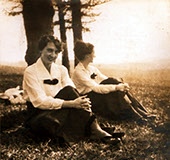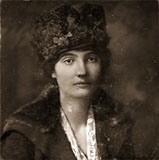Fleurs du Mal Magazine


Or see the index

Nacht im Schützengraben
Tief will sich der Himmel neigen,
Schwer von seiner Sternenlast.
Runde Leuchtraketen steigen
Auf zu seinem Blaudamast.
Rückwärts ist mein Kopf geglitten
Auf den Sand der Schulterwehr
Und mir ist, als wär ich mitten
In dem weißen Silbermeer.
Schüsse fallen, Rufe kommen,
Meine Hand kühlt kühlen Wind,
Und ich weiß kaum, traumbenommen,
Noch, was Stern, was Augen sind.
Gerhard Moerner
(1894-1917)
Aus: „Aus dem Felde“. Gedichte.
Kugelverlag, Hamburg 1917.
• fleursdumal.nl magazine
More in: *War Poetry Archive, - Archive Tombeau de la jeunesse, Archive M-N, WAR & PEACE

Shelley in the Trenches 2nd May 1916
Impressions are like winds; you feel their cool
Swift kiss upon the brow, yet know not where
They sprang to birth: so like a pool
Rippled by winds from out their forest lair
My soul was stir’d to life; its twilight fled;
There passed across its solitude a dream
That wing’d with supreme ecstasy did seem;
That gave the kiss of life to long-lost dead.
A lark trill’d in the blue: and suddenly
Upon the wings of his immortal ode
My soul rushed singing to the ether sky
And found in visions, dreams, its real abode –
I fled with Shelly, with the lark afar,
Unto the realms where the eternal are.
John William (Will) Streets
(1886 –1916)
Shelley in the Trenches 2nd May 1916
• fleursdumal.nl magazine
More in: - Archive Tombeau de la jeunesse, Archive S-T, Shelley, Percy Byssche, Streets, Will, WAR & PEACE

The Beggar
Showing his ill-made frame
And mumbling of troubles many,
Along a public street,
The cripple calls for a penny.
Inviting sympathy,
By his rags and his withered arm,
He follows and frets till we argue
A penny can do him no harm.
Just now, in this intimate room,
Sagacious, clever and witty,
Exposing his hardships, a Beggar
Beckoned his friends for pity.
Ugh! By displaying his pains,
By showing his heart was ashen,
By revealing his twisted life,
He played for a glance of compassion.
Strange how I longed to laugh ;
His feebleness was funny.
I thought : ” He’s only a Beggar
And affection is golden money.
Gladys Cromwell
(1885-1919)
The Beggar
From: Poems 1919
• fleursdumal.nl magazine
More in: Archive C-D, Cromwell, Gladys, Gladys Cromwell, WAR & PEACE

The Gates of Utterance
There is a throng within the gates,
A pressing, diverse throng;
Without, a peaceful throng awaits,
To which I would belong.
Within the gates the varied folk
Advise discordantly;
Without, the poet-crowds convoke
To council harmony.
Within the gates are all the heights
And depths of serried powers;
But when a lyric theme invites,
I reach out-lying bowers
Where dwell the bards of quiet years ;
I join my song to theirs;
My glad, unfettered spirit hears
The melody it shares.
Gladys Cromwell
(1885-1919)
The Gates of Utterance
From: Songs of the Dust, 1915
• fleursdumal.nl magazine
More in: Archive C-D, Archive C-D, Cromwell, Gladys, Gladys Cromwell

The Breath
A trembling crest
Of smoke, the winter sky
Congeals to bloom,
To please a poet’s eye:
A slender reed
Arisen from some gold
Recess or womb
Of flame to spaces cold.
Between the twigs,
That for a nest are spun
On flight’s grey loom,
A sapphire thread may run
And so between the grey,
The woven boughs of trees,
A little plume
Of mist the poet sees :
It will suffice —
Too scant a breath to name
For him to whom
It signifies a flame.
Gladys Cromwell
(1885-1919)
The Breath
From: Poems 1919
• fleursdumal.nl magazine
More in: Archive C-D, Cromwell, Gladys, Gladys Cromwell

Compensation
You never told me, never, yet I know
You hold a sadness in disguise, unseen
Behind the days and years that intervene
Since you renounced ambition long ago.
Whence comes the tender love that you bestow
To feed our loves? Behind your self serene
There burns a golden passion, how you screen
With radiant life the flame you must forego !
Then you assume our love is ample meed,
Atonement, oh ! I wonder any deed
Of ours can ease your spirit s lassitude,
Or lift your lonely heart ! Our stars elude
Your sun that made them bright your solitude.
Deprived, no boon avails to fill your need.
Gladys Cromwell
(1885-1919)
Compensation
From: Songs of the Dust, 1915
• fleursdumal.nl magazine
More in: Archive C-D, Cromwell, Gladys, Gladys Cromwell

The Crowning Gift
I have had courage to accuse;
And a fine wit that could upbraid;
And a nice cunning that could bruise;
And a shrewd wisdom, unafraid
Of what weak mortals fear to lose.
I have had virtue to despise
The sophistry of pious fools;
I have had firmness to chastise;
And intellect to make me rules,
To estimate and exorcise.
I have had knowledge to be true;
My faith could obstacles remove;
But now, by failure taught anew,
I would have courage now to love,
And lay aside the strength I knew.
Gladys Cromwell
(1885-1919)
The Crowning Gift
• fleursdumal.nl magazine
More in: Archive C-D, Cromwell, Gladys, Gladys Cromwell

The Fugitive
Fool, fool,
They can hear thy frighted feet,
And they poke fun at thee,
Or pity thee,
Or pity thee.
They can hear thy steps retreat,
Shuffling timidly.
Thy gait is hobbling and uncouth,
For stubborn is earth’s clay;
There was a day,
There was a day,
When from the doom of its own youth,
Thy spirit stole away.
Do they not know thy spirit’s home?
Thy spirit, glancing, glides
Beneath all tides,
Beneath all tides.
It is a coral under foam;
In the cool deep it hides.
For lo, the yielding element
Of immortality
Is like the sea,
Is like the sea.
Do they not hear, in wonderment,
The tides enfolding thee?
Gladys Cromwell
(1885-1919)
The Fugitive
• fleursdumal.nl magazine
More in: Archive C-D, Cromwell, Gladys, Gladys Cromwell

Transmission
A shell, expressed the verity
In tones more limpid than the sea,
Distilled the sea s infinity.
A mellow leaf disclosed the true
In more than sun s pellucid hue,
The sun was tinged in passing through.
A wing revealed the sky unseen,
Till motion made the air serene,
A wing a soaring life, I mean.
Gladys Cromwell
(1885-1919)
Transmission
fleursdumal.nl magazine
More in: Archive C-D, Cromwell, Gladys, Gladys Cromwell

Sibylla Schwarz
Ach, Amor, nimb dein schwäres Joch von mir
Ach, Amor, nimb dein schwäres Joch von mir,
kans müglich seyn, nimb wegk die Liebes Plagen,
dein Joch ist schwer, drümb kan ichs nicht mehr tragen,
du bist zu süß, drümb klag ich über dir.
Nimb wegk die Last, sie unterdruckt mich schier:
was sol ich doch vohn deinen Pillen sagen,
die bitter sind, und doch mir wohl behagen?
Ich steh und geh im Zweiffel für und für:
wo sol ich hin? Im fall ich bin allein
so denck ich nuhr: Ach möcht ich bey Ihr seyn!
bin ich bey Ihr, so steht mir vohr das Scheiden;
liebt sie mich dan, das ich so sehr begehr,
so ist mir doch die Süßigkeit zu schwär;
Ich will den Tod wohl für die Liebe leiden.
Sibylla Schwarz (1621 – 1638)
Gedicht: Ach, Amor, nimb dein schwäres Joch von mir
fleursdumal.nl magazine
More in: Archive S-T, Archive S-T, SIbylla Schwarz
“The staggering thing about a life’s work is it takes a lifetime to complete,” Craig Morgan Teicher writes in these luminous essays.
 We Begin in Gladness considers how poets start out, how they learn to hear themselves, and how some offer us that rare, glittering thing: lasting work. Teicher traces the poetic development of the works of Sylvia Plath, John Ashbery, Louise Glück, and Francine J. Harris, among others, to illuminate the paths they forged—by dramatic breakthroughs or by slow increments, and always by perseverance.
We Begin in Gladness considers how poets start out, how they learn to hear themselves, and how some offer us that rare, glittering thing: lasting work. Teicher traces the poetic development of the works of Sylvia Plath, John Ashbery, Louise Glück, and Francine J. Harris, among others, to illuminate the paths they forged—by dramatic breakthroughs or by slow increments, and always by perseverance.
We Begin in Gladness is indispensable for readers curious about the artistic life and for writers wondering how they might light out—or even scale the peak of the mountain.
Though it seems, at first, like an art of speaking, poetry is an art of listening. The poet trains to hear clearly and, as much as possible, without interruption, the voice of the mind, the voice that gathers, packs with meaning, and unpacks the language the poet knows.
It can take a long time to learn to let this voice speak without getting in its way. This slow learning, the growth of this habit of inner attentiveness, is poetic development, and it is the substance of the poet’s art. Of course, this growth is rarely steady, never linear, and is sometimes not actually growth but diminishment—that’s all part of the compelling story of a poet’s way forward. —from the Introduction
Craig Morgan Teicher is an acclaimed poet and critic. He is the author of We Begin in Gladness: How Poets Progress, and three books of poetry, including The Trembling Answers, winner of the Lenore Marshall Poetry Prize, and he regularly writes reviews for Los Angeles Times, NPR, and the New York Times Book Review. He lives in New Jersey.
We Begin in Gladness.
How Poets Progress
by Craig Morgan Teicher
Publication Date 11/6/18
Format: Paperback
ISBN 978-1-55597-821-1
Subject: Literary Criticism
Pages 176
Graywolf Press
$16.00
# new books
more info: http://craigmorganteicher.com/
How Poets Progress
fleursdumal.nl magazine
More in: - Book Lovers, - Book Stories, Archive S-T, Archive S-T, Art & Literature News, Sylvia Plath, The Art of Reading

The true story of twin sisters, Dorothea and Gladys Cromwell, born into New York’s Gilded Age, living lives of wealth and privilege, as told by Dennis Whitehead.
Amid the fervor of America’s entry into the First World War, the sisters volunteered for service with the American Red Cross in France, a country they knew and loved. To French soldiers seeking refreshment and solace in the Red Cross canteen, the identical twins were known as anges jumeaux, the twin angels.
Witnessing the non-stop horrors in the worst fighting in the war, the sisters were utterly exhaustion, both mentally and physically, when they boarded the SS La Lorraine for the return journey home. They had wished to continue their service to the people of France after the fighting stopped but were convinced to return to New York by their brother.
What happened on that ship, on that frigid January 1919 evening, almost one-hundred years ago, is one of the great untold stories of World War I, and the impact that modern warfare had upon not just the men in the trenches, but upon its women and other non-combatants, as well as civilians, that remained unrecognized until the Vietnam War.
Dennis Whitehead: A native of Cincinnati and a graduate of Ohio University, Dennis Whitehead is a writer, photographer, and media producer in Arlington, Virginia.

Shell Shock: Twin Sisters Born Into New York’s Gilded Age Struck Down by the Horrors of War
by Dennis Whitehead
Kindle Edition
$2,99
Available for download
Language: English
File Size: 27502 KB
Print Length: 52 pages
Publisher: MMImedia LLC (July 18, 2018)
Publication Date: July 18, 2018
Amazon Digital
# More information and link with Amazon Kindle Edition
Shell Shock is the story of the twin Cromwell sisters who served with the American Red Cross in World War I France. Witnessing the unrelenting horrors of war, the Cromwell sisters illustrate the unrecognized trauma wrought upon non-combatants in the First World War. Gladys Cromwell (1885-1919) was a very talented poet.
# Digital biography
American writers
Gladys Cromwell
fleursdumal.nl magazine
More in: #Biography Archives, *War Poetry Archive, - Book Stories, Archive C-D, Archive W-X, AUDIO, CINEMA, RADIO & TV, Gladys Cromwell, Photography, WAR & PEACE
Thank you for reading Fleurs du Mal - magazine for art & literature